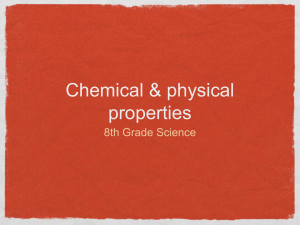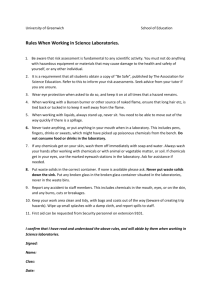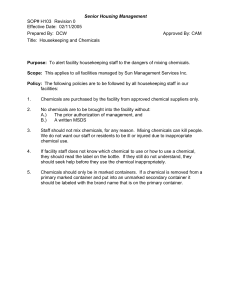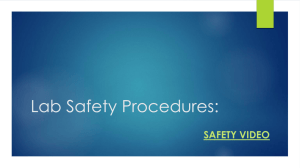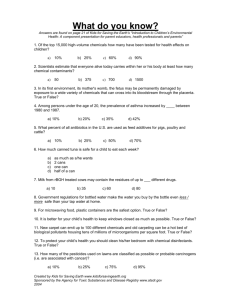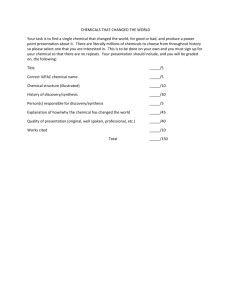Science Safety Quiz Review
advertisement
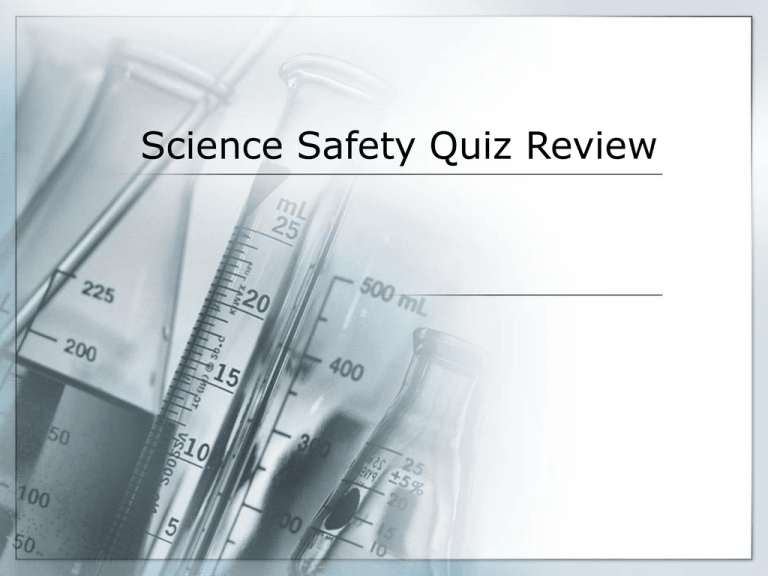
Science Safety Quiz Review When in the science classroom, conduct yourself in a responsible manner- At all times When the teacher says to Only when working on a lab Only when preparing materials When in the science classroom, conduct yourself in a responsible manner- At all times If you do not understand a part of a procedure you should Proceed with the lab anyway Skip it and come back later Work with another group Ask the teacher immediately If you do not understand a part of a procedure you should- Ask the teacher immediately Never work in a lab or classroom without A notebook A teacher A textbook A partner Never work in a lab or classroom without- A teacher When first entering a science room Do not touch anything until instructed Immediately begin working on the lab Go and check all equipment Walk around and check each station When first entering a science room Do not touch anything until instructed You should read all instructions for a lab Only when you don’t know it After you set up the equipment As you perform the lab Before you begin any part of the lab You should read all instructions for a lab- Before you begin any part of the lab Unauthorized experiments means Doing an experiment without permission Just messing around to see what happens Mixing chemicals just for fun All of the above Unauthorized experiments means- All of the above Unauthorized experiments are OK sometimes Alright if the teacher is in the room Not allowed (prohibited) OK if you plan to be a chemist Unauthorized experiments are- Not allowed (prohibited) Horseplay is Never allowed in class Alright in the classroom Alright in the lab area only Alright anytime Horseplay is Never allowed in class To put out a fire on a person’s clothing The fire extinguisher The fire blanket Water Any chemical at your lab station To put out a fire on a person’s clothing The fire blanket In case of an emergency, such as a fire or earthquake or even a practice drill- Grab your stuff and exit immediately Turn off gas and/or electrical before exiting Stop, drop, and roll Run out leaving all behind In case of an emergency, such as a fire or earthquake or even a practice drill- Turn off gas and/or electrical before exiting Report any and all accidents When you get time Only if they are really serious Only if they involve blood To the teacher immediately Report any and all accidents- To the teacher immediately Areas splashed with chemicals should be flushed with water Until it feels better For 20 seconds For 20 minutes For 5 minutes Areas splashed with chemicals should be flushed with water- For 20 minutes If you or your lab partner wear contacts and a chemical is splashed in the eye Rub the eyes to slid them around Keep your eyes closed and let them tear Don’t worry about it Try to remove them after 2-3 minutes of flushing but keep flushing If you or your lab partner wear contacts and a chemical is splashed in the eye- Try to remove them after 2-3 minutes of flushing but keep flushing The correct way to smell a chemical is to Sniff directly over the container Smell it from a distance Pour out a little and smell it Dip your finger in a smell it The correct way to smell a chemical is to Smell it from a distance When mixing acids and water together, always Add water to acid Add them at the same time Add acid to water Add a base to them first When mixing acids and water together, always Add acid to water When using a Bunsen burner, never Leave it unattended Reach over the flame Leave it near volatile materials All of these When using a Bunsen burner, never- All of these While doing any experiment you should always Wash your hands with soap and water when finished Keep hands away from face, eyes, mouth, and body while working Clean up lab area All of the above While doing any experiment you should always- All of the above Observing good housekeeping practices means- Only the aisles are clear backpacks are kept on the table work areas are clean and tidy unused equipment is never put away Observing good housekeeping practices means- work areas are clean and tidy Lab aprons are used for The protection of you and your clothing protecting your best clothes wiping your hands on wiping out glassware Lab aprons are used for The protection of you and your clothing When working in the lab you must Tie back long hair wear shoes that completely cover the foot not wear baggy clothing all of these When working in the lab you must- all of these When using knives or other sharp objects,always cut Towards your body while holding the object in your hand with someone holding the object away from your body When using knives or other sharp objects,always cut- away from your body You should know the location and use of the Fire extinguisher fire blanket eyewash station all of these You should know the location and use of the- all of these You must wear approved safety goggles or safety glasses When you mix chemicals any time chemicals, heat or flame are used when using glassware when you feel like it You must wear approved safety goggles or safety glasses- any time chemicals, heat or flame are used Wash bottles may be filled with Acid only all chemicals water only alcohol only Wash bottles may be filled with- water only You may enter the science storage room or preparation area if you have your teacher’s permission you break a piece of equipment you need a piece of equipment a student ask you to get something You may enter the science storage room or preparation area if you have your teacher’s permission Dispose of chemicals in Their proper disposal container the sink the trash can their original container Dispose of chemicals in Their proper disposal container If you see something in the classroom or laboratory that is dangerous, tell the teacher When you have time immediately after class when the teacher is available If you see something in the classroom or laboratory that is dangerous, tell the teacher- immediately When pouring chemicals from one container to another you should Hold the containers away from your body pour them into their original containers cover your eyes sponge up what you spill When pouring chemicals from one container to another you should Hold the containers away from your body
